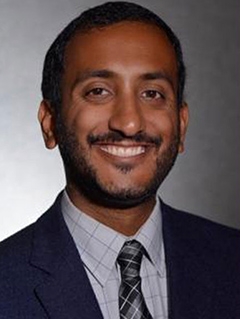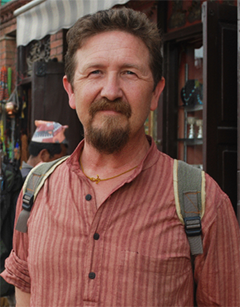Two Middlebury Faculty Members Awarded Fulbright Fellowships
Two Middlebury College faculty members have been awarded Fulbright fellowships through the Fulbright Flex option for research abroad over the coming two years. Ajay Verghese, associate professor of political science, will conduct two studies on the local dynamics of political Hinduism in India. William Waldron, professor of religion, will conduct a multifaceted study exploring the life and meaning of the Five Buddha Families in Nepal.
“We are thrilled that Ajay and Bill will carry on the long tradition of Middlebury faculty building on their scholarship through Fulbright grants,” said Provost and Executive Vice President Michelle McCauley. “This work adds great value to their academic disciplines while providing new perspectives to their teaching.”

Ajay Verghese: Two Studies of Political Hinduism
Verghese’s three-year project—funded through the Fulbright Flex option—will explore two emerging trends. The first examines the rise in popularity of spiritual teachers—often called “gurus,” “yogis,” or “godmen”—who are explicitly associated with political parties and organizations. The second investigates a potential backlash to this politicization of religion, focusing on the rise of “secular Hinduism” among upper-middle-class Hindus in Delhi.
He will begin his research next summer in Udaipur, where he will collaborate with colleagues at Mohanlal Sukhadia University. He will then spend the academic year writing up his findings and presenting his work at conferences in the United States. In the summer of 2026, he will return to India to continue his fieldwork, eventually relocating to Delhi, where he will begin drafting an article on secular Hinduism.
Verghese plans to publish his findings in political science and sociology journals. The research will also serve as the foundation for his third book, which will focus on Hinduism and Indian politics.
“Both of these projects are at a very early stage, so I am not going to India with a very systematic research design,” said Verghese. “But that’s the fun of it—getting to talk to new people, have spontaneous conversations, learn about things in a very inductive way.”
In his Fulbright project description, Verghese writes: “Hinduism is the world’s oldest and third most populous religion, and yet American social science research on religion still overwhelmingly focuses on the ‘Abrahamic’ monotheistic traditions of Judaism, Christianity, and Islam.” By combining this new research with work he has conducted over the past 10 years, he aims to broaden the discipline’s engagement with Hinduism and challenge findings drawn from Abrahamic religions that may not apply in the Indian context.
“India and Hinduism are both still understudied in American political science,” he said. “So new articles, stories, and fieldwork photographs will hopefully do a lot to teach students about these important topics.”
Verghese, who joined Middlebury’s faculty in 2020, teaches courses on the comparative politics of religion, the politics of India, and ethnic conflict. He is a previous recipient of fellowships from the Fulbright Program, the American Institute of Indian Studies, and the Woodrow Wilson International Center for Scholars. His 2020 article on Hindu religiosity in Politics and Religion received the American Political Science Association’s Ted Jelen Award for the best article published in that journal, as well as honorable mention for the Award for Concept Analysis in Political Science, given every three years by the International Political Science Association.

William Waldron: The Symbolism and Practice of the Five Buddha Families in Lalitpur, Nepal
William Waldron, professor of religion, received a Fulbright U.S. Scholar Award to conduct a multifaceted study exploring the life and meaning of the Five Buddha Families in Nepal over the 2025–2027 academic years.
Waldron, whose project is funded through the Fulbright Flex option, will examine how the symbols of the Five Buddha Families—also known as the Five Tathāgatas or Five Dhyāni Buddhas—are used in the lives of contemporary Nepali Buddhists. He will also study the historical development of related meditative practices in Nepal and India and their traditional doctrinal interpretations in the Yogācāra school of Mahāyāna Buddhism.
“In a world saturated with images, it is easy to overlook the profound ways that symbols affect human consciousness, both individually and collectively—consider how we respond to flags,” said Waldron. “Suggesting perspectives on our own implicit practices, this project on the Five Buddha Families of Vajrayāna Buddhism in Nepal investigates the many integrated ways—artistic, ritual, contemplative—that South Asian Buddhists have expressed their aspirations for transformation and awakened activity in the world.”
A guiding research question seeks the meaning of the symbolism of the Five Buddha Families, which is at the heart of Vajrayāna Buddhism, and how they function in the lives of yogis and lay persons alike. Waldron will also try to discover how these esoteric symbols become public art in Nepal. “In short, we aim to trace the liniments connecting these seemingly discrete dimensions of religious practice and imagery, and thereby provide a more grounded, more holistic, picture of Vajrayāna practice in Nepal,” writes Waldron.
As part of his research, Waldron is working with a local art school and their students to archive the contemporary artifacts—in painting and sculpture—of the Five Buddha Families in Lalitpur, Nepal. He will also partner with local historians to trace their historical development, and draw upon his own expertise in classical Yogācāra Buddhism to interpret their complex symbolism. He plans to create a website to post their results through photographs, data from fieldwork, summaries of historical investigations, and doctrinal interpretations of the Five Buddha Families. Publishers of scholarly works on Nepal have expressed interest in publishing his findings.
Waldron, who joined Middlebury’s faculty in 1996, teaches courses on the South Asian religious traditions of Hinduism and Buddhism, Tibetan religion and history, comparative psychologies and philosophies of mind, and theory and method in the study of religion. His publications focus on the Yogācāra school of Indian Buddhism and its dialogue with modern thought. His first book was The Buddhist Unconscious: The Ālaya-vijñāna in the Context of Indian Buddhist Thought (Routledge Curzon, 2003). His more recent book is Making Sense of Mind Only: Why Yogācāra Buddhism Matters, published by Wisdom Publications in 2023.
About the Fulbright Program
Fulbright Scholar Awards offer scholars the opportunity to teach and conduct research abroad, playing a critical role in U.S. public diplomacy. The Fulbright Program annually supports approximately 8,000 students, scholars, teachers, and professionals, including more than 800 U.S. scholars in over 160 countries.
Established by Congress in 1946 and administered by the U.S. Department of State’s Bureau of Educational and Cultural Affairs, the Fulbright Program promotes mutual understanding between the United States and other nations through academic exchange. Learn more online.

